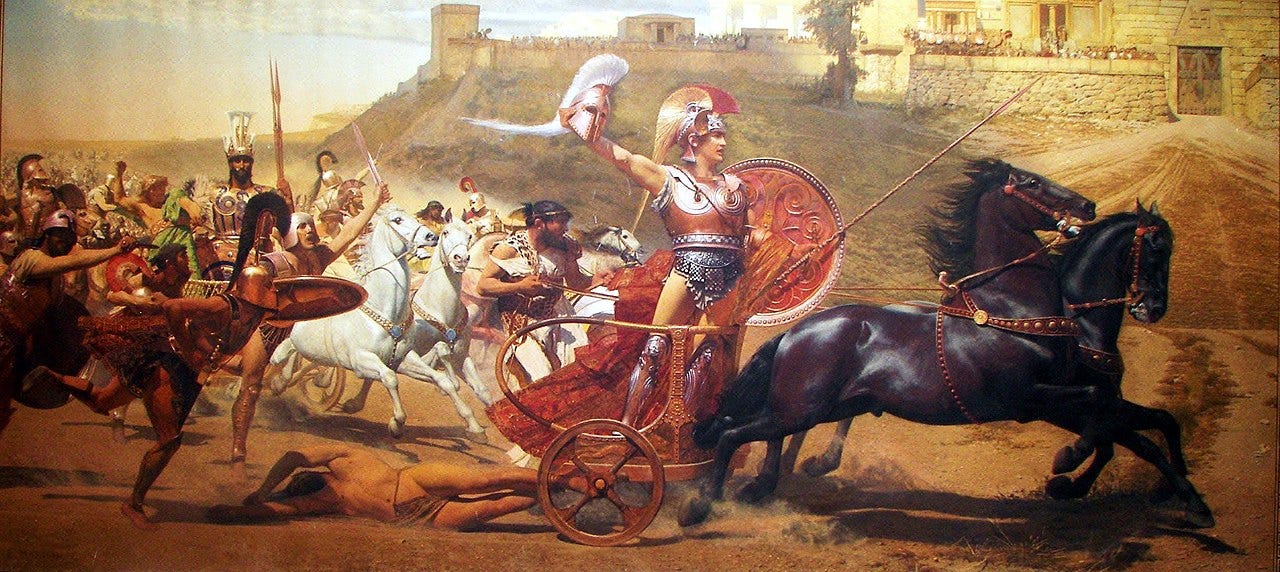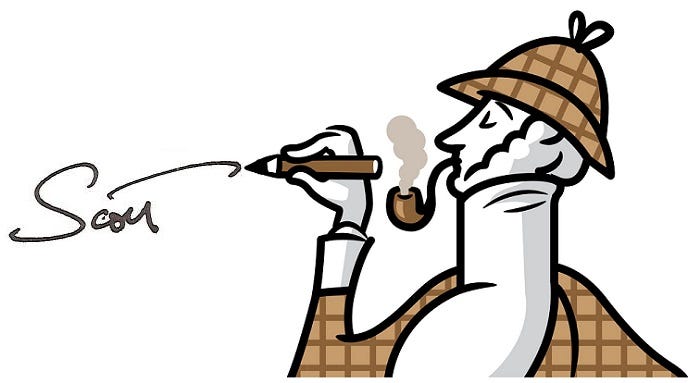
“Much has been given us, and much will rightfully be expected from us. We have duties to others and duties to ourselves; and we can shirk neither. We have become a great nation, forced by the fact of its greatness into relations with the other nations of the earth, and we must behave as be seen as a people with such responsibilities.”
— Theodore Roosevelt, 1905
The word “hero” once belonged to the province of myth, bestowed on the half-divine figures who strode the stage of Homer’s epics or illuminated the margins of medieval chronicles.
Achilles in his rage, Beowulf in his long night’s battle with Grendel, Joan of Arc at the stake — such figures lived and died not in pursuit of comfort but of destiny, their stories kept alive because they bore the burden of something larger than themselves.
To call someone a hero was to suggest that courage, sacrifice, and fate conspired to place a single human life at the axis of history.
The Diluted Hero
But as with so many words conscripted into the service of mass culture, “hero” has undergone a slow dilution, thinned into the lukewarm broth of marketing copy and political speech.
The supermarket clerk is a “hero” for showing up during a pandemic; the venture capitalist a “hero” for betting on the right startup; the celebrity athlete a “hero” for remembering to thank his mother. What once implied sacrifice now signals publicity. The hero has been commodified, shrink-wrapped, and sold by publicists who would never risk a paper cut, much less their lives.
The Greeks understood heroism not as comfort but as tragedy. The hero’s path led as often to ruin as to triumph, and always to death. The heroic act was not safe, nor prudent, nor guaranteed applause — it was an affront to fortune, an invitation to the gods’ envy.
Shakespeare, in his rendering of Henry V, caught something of this paradox: the young king, urging his “band of brothers” on St. Crispin’s Day, spoke less as a general with a winning plan than as a gambler staking his life and theirs on the turn of a card.
The speech lives not because of strategy but because of its spirit — the willingness to embrace the awful risk that history demands of its chosen few.
“This story shall the good man teach his son;
And Crispin Crispian shall ne’er go by,
From this day to the ending of the world,
But we in it shall be remembered—
We few, we happy few, we band of brothers;”
— William Shakespeare, 1599
Visibility Is Not Valor
In our own time, we mistake visibility for valor. The soldier at Omaha Beach had no Instagram feed, nor did Harriet Tubman pause to update her status while leading slaves north by night. Their heroism resided in anonymity, in action undertaken with no promise of reward.
Compare this with a billionaire astronaut strapping himself into a rocket for a fifteen-minute ascent into the stratosphere, heralded on live-stream as a titan of progress. The media may call him heroic, but he risks no more than an overcooked soufflé at the post-launch banquet.
True heroism rarely announces itself.
Rosa Parks did not set out to be a heroine when she refused to give up her seat; she merely insisted on the dignity owed to every human being, and in so doing shifted the conscience of a nation.
The firefighters who climbed the stairs of the World Trade Center on September 11th did not imagine their names inscribed in marble; they acted because the moment demanded action, and in answering that demand, they gave their lives.
Heroism arises in the refusal to look away when circumstance demands witness and action.
“A hero is an ordinary individual who finds the strength to persevere and endure in spite of overwhelming obstacles.”
— Joseph Campbell, 1949
An Ethic, Not an Accolade
The ancients linked heroism to remembrance: the building of monuments, the chanting of epics, the eternal flame. We might do better to think of it as an ethic, not an accolade: the capacity to risk one’s own safety, reputation, or fortune for the sake of something larger than oneself.
That may mean leading revolts against tyrants, or it may mean speaking truth in a boardroom where lies have settled comfortably into policy. It is not found in the applause of the crowd but in the silence of the moment before the deed, when a person chooses to act though every sensible instinct counsels retreat.
Against this backdrop, the rare figures who deviate from script stand out all the more. When Paul O’Neill took the helm at Alcoa in 1987, he startled analysts by declaring that his primary concern was not earnings per share but worker safety. He made the company’s board nervous, but within a decade Alcoa’s profits rose precisely because its employees trusted leadership enough to innovate without fear.
Likewise, when CVS Health announced in 2014 it would stop selling tobacco products — a decision that cost the company $2 billion in annual revenue — it acknowledged that profiting from addiction was incompatible with its stated purpose as a healthcare company.
These were not gestures designed for applause but wagers that morality could coexist with profitability.
“True heroism is remarkably sober, very undramatic. It is not the urge to surpass all others at whatever cost, but the urge to serve others at whatever cost.”
— Arthur Ashe, 1991
Courage: Not Extinct, But Rare
If the word “hero” retains any meaning at all, it is to designate those who, in the silence before the deed, choose duty over ease, risk over safety, principle over applause.
They may not be the heroes we deserve — our age too often mistakes celebrity for sacrifice — but they are the heroes who keep alive the faint hope that civilization is more than the sum of its markets and machines.
To call someone a hero, then, is not to hand them a medal or a hashtag, but to acknowledge that for a moment, however brief, they made visible the best of what human beings are capable of being.
And perhaps that is why we still need the word: to remind ourselves that courage, though rare, is not extinct, and that our lives, however ordinary, are measured by whether we recognize the call when it comes.
There’s so much to learn,
One more thing
The Archives have an entire section on Courage. Check it out as well as dozens of other topics.




I’m super curious what inspired this post. I certainly don’t authenticate heroism with celebrity or ordinary and uncourageous acts. Heroism isn’t practiced with intent or expectation of personal gain. That said, the market may reward heroism because it is so rare and we as Humans appreciate those who demonstrate selflessness because so many of us cannot stop being selfish, and admire those who can.
💕